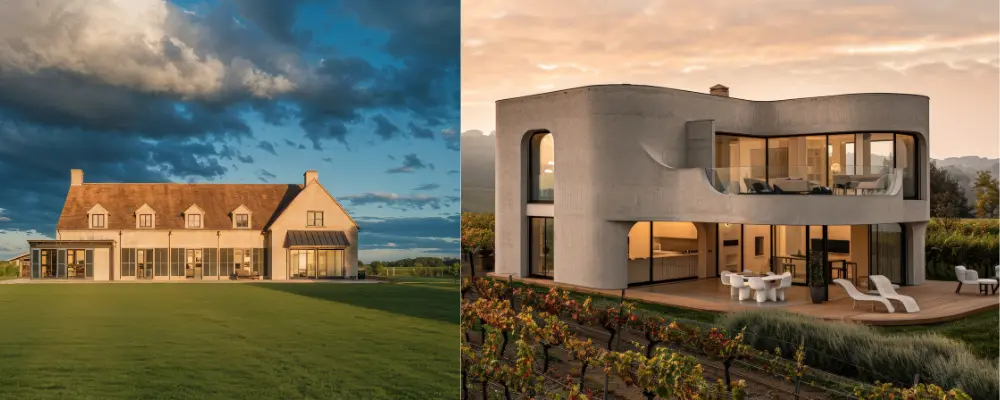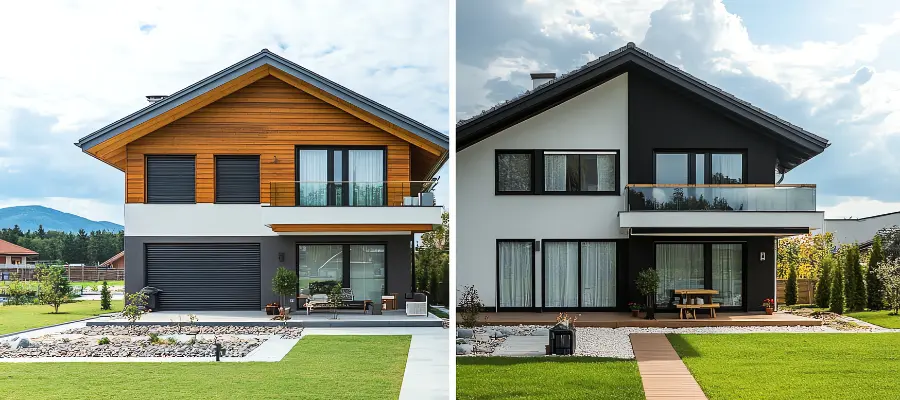In today’s fast-paced world, people are searching for homes that are not only comfortable but also suit their lifestyle choices. While farmhouses offer a peaceful escape close to nature, villas promise luxury and modern living in well-connected locations.
But which one is right for you?
Read this blog to understand the differences between a farmhouse and a villa, decide which gives better investment returns, and make your decision accordingly.
What is a Farmhouse?
You can understand a farmhouse as a type of property that is constructed in rural or semi-rural areas surrounded by nature, like agricultural or farmlands. Traditionally, these houses are built by farmers to get in touch with their crops and to protect their agricultural lands. Nowadays, people find this as an escape from their stressful corporate work life. They use this as a perfect spot during weekends or vacations.
Major farmhouse features are that they can vary in size and style. But they often include gardens, patios, and open porches. It is one of the better investments in terms of real estate, and seniors often choose this as a home for retirement. It is also used as a vacation home, agritourism, and homestay.
What is a Villa?
You can understand a villa as a luxurious and independent house, commonly built in urban or semi-urban areas, including cities, suburbs, or exclusive gated communities. Villa features typically include spacious, independent homes that are set away from the busy city life. It often includes spacious rooms, private gardens and pools, and high-end amenities. Most villas are a symbol of luxury and class. Along with privacy, you can enjoy exclusivity and comfort. Villas are preferred by those who seek upscale living in a standalone or unattached living situation.
Difference Between Farmhouse and Villa

| Factor | Farmhouse | Villa |
| Location | Usually found on the outskirts of cities or in rural areas, surrounded by nature and farmland. | Mostly located in urban or suburban areas, often inside gated communities. |
| Space | Offers a large plot with lots of open space, gardens, and sometimes farmland. | Built on smaller plots but includes landscaped gardens and private outdoor areas. |
| Design | Has a rustic look, often using natural materials and simple architecture. | Features modern architecture, luxury finishes, and smart home technology. |
| Cost | Land is cheaper per square foot, but overall costs can be high due to large size and maintenance. | Higher price per square foot, but less maintenance than farmhouse as communities are managed. |
| Lifestyle | Gives a peaceful, private, and nature-focused lifestyle, good for relaxation and wellness. | Offers a luxurious and convenient lifestyle with easy access to city amenities. |
| Investment Potential | Can appreciate well over time and earn income from farm stays or wellness tourism. | High resale value and strong demand for luxury rentals, especially in popular city areas. |
| Security | Security may be limited due to remote location; some new projects offer gated access. | Gated communities, CCTV, and security staff are standard features. |
Pros and Cons of Farmhouse Living
Advantages of Farmhouse Living
By making an investment in farmhouse living, you can enjoy the following benefits:
More Space & Privacy
Compared to other types of houses like villas, farmhouses are often built on large plots (such as 2000–5000+ sq. yards). Therefore, they provide sufficient space to include home lawns, gardens, and other personal elements. Since you leave enough space between the house and the compound walls, you can achieve more privacy, and you don’t require soundproofing.
Closer to Nature
As the name indicates, these houses are constructed in connection with farms or other agricultural lands, offering privacy in connection with the surrounding nature. Therefore, you can effortlessly expect clean air, green surroundings, and eye-catching views. Thus, it is the best living space for people searching for peace of mind.
Lower Initial Cost
When compared to urban villas, you can expect considerably less initial cost to purchase farmhouses, mainly in rural or semi-urban locations. But in the case of new construction, the overall construction cost depends on your finalised plot size and the features, material use and styles.
Potential for Farming/Extra Income
You can create a new hobby by using the garden land for organic farming and orchards for parallel income. Farmhouses can also be rented out for homestays or agritourism, generating extra income.
If you ever need money, you can sell a portion of your farmhouse. This gives you the flexibility to manage your property easily and sell it when the market price is good, helping you earn better returns.
Limitations of Farmhouse Living
Higher Maintenance
As farmhouses are built as luxurious, wide properties, you need to maintain them regularly along with land management and repairs, and sometimes you may need to hire a caretaker. Thus, the overall annual maintenance costs rise widely, especially with agricultural use.
Limited Urban Amenities
As farmhouses are often constructed in rural areas, these areas are commonly far from hospitals, schools, and shopping centres, making it difficult to access essential services.
Security Concerns
As the construction of farmhouses is very distant from other buildings, this can create isolated living locations. It can be more vulnerable to theft or emergencies, demanding extra investment in security systems or safety personnel.
Construction Complexity
Without proper support and guidance, you will feel the construction of a farmhouse is a tricky task. This includes the purchase of suitable land, getting necessary legal approvals, and ensuring that basic things like water, electricity, and roads are available. The overall cost and time to build can change greatly based on the place, design, and materials you choose. Hence, choose an expert construction company to overcome these challenges.
Pros and Cons of Villa Living
Villa Benefits You Need to Understand
Modern Luxuries
As villas will be available in gated communities, you can enjoy shared facilities like parks, clubhouses, and walking tracks. Villas can have high-end luxuries such as smart home technologies, private swimming pools, home gyms, and outdoor spaces.
Better Security
A villa in a gated community will be equipped with surveillance systems, controlled entry points, and trained security personnel, providing a safer living environment compared to farmhouses that are standalone properties.
Urban Convenience
Villas are typically built in or near urban areas, giving residents easy access to essential services such as schools, hospitals, supermarkets, and entertainment zones.
Higher Rental Income
Due to their premium features and prime locations, villas are attractive to corporate tenants and short-term luxury renters. This makes them a strong option for earning higher rental returns and long-term property value appreciation.
Limitations of Villa
Expensive Purchase & Maintenance
Villas command high purchase prices due to their luxury features and prime locations. Ongoing costs include property taxes, homeowners association (HOA) fees, and maintenance of amenities.
Less Privacy
Although they offer more privacy than apartments, villas in planned communities may still have close neighbours and shared spaces, limiting their privacy as compared to farmhouses.
Limited Outdoor Space
You can include smaller gardens or outdoor areas, not large-scale gardening or outdoor activities, compared to farmhouses.
Limited Customisation (Buying Scenario)
Buying a ready-made villa means less flexibility to alter the floor plan or features. Customisation is possible when constructing but involves higher costs and longer timelines.
Cost Comparison: Farmhouse vs. Villa
Before sticking on an option between a farmhouse and a villa, you need to consider both cost ranges, as they offer distinct financial benefits.
- As farmhouses are built in rural or peri-urban areas, they are more affordable than villas. However, you need to consider long-term investments in maintenance and safety features. You need to keep a large amount to maintain these large farmhouses.
- Villas always demand high initial costs as they are constructed in urban or suburban areas. However, it requires minimal maintenance costs compared to farmhouses. Most villas are part of managed communities; thus, societies handle common area maintenance and security.
Return on Investment (ROI):
Farmhouses usually appreciate (growth in value) slowly, but they can give a steady income if used for farm stays, wellness retreats, or tourism.
Villas, especially in big cities, often increase in value faster and are easier to sell at a good price. This makes villas a better choice for investors who want quicker profits.
Farmhouse vs Villa: Which is Better for Living?
When deciding on a daily living purpose, consider your daily requirements and lifestyle preferences.
Farmhouses are the best choice for seniors, retirees, and nature lovers. This will help reduce stress on remote workers with its connection to nature. Living in a farmhouse helps to improve mental and physical health with natural light and air circulation. You can grow vegetables organically with your garden space.
Villas are best suited for families, working professionals, and those who seek a luxurious, convenient lifestyle. Villas offer easy access to urban amenities such as schools, hospitals, shopping centres, and entertainment, all within secure, well-managed communities. They combine privacy with modern comforts, making daily life seamless and enjoyable.
Farmhouse vs Villa: Which is Better for Investment?
Choose a farmhouse if your goal is passive income from tourism or wellness retreats, and you are comfortable with a longer investment horizon. Opt for a villa if you want quicker returns, higher liquidity, and strong rental demand in urban markets. Consult a real estate expert to make a better investment!

